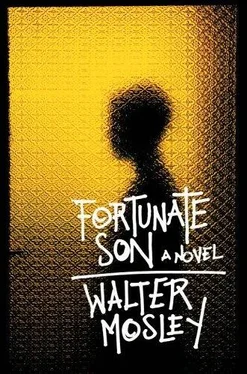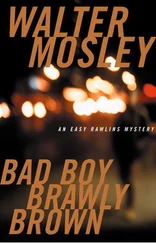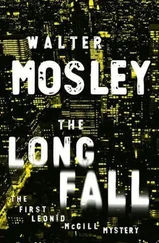“Really die?”
“I don’t know. I think that I might have. But even if I didn’t there would have been something missing from the rest of my life. I tried not to call you. I put down the phone ten times before I dialed the number. But once I talked to you I couldn’t stop myself. I couldn’t.”
“But you love Drew.”
“Every night when you go home I want to call him. I miss his jokes and his trying to show off. I used to help him rewrite his papers. I was better at school than he was.”
“Better than me too,” Eric said. He put a hand on her thigh, but she pulled away.
“But you don’t care. If I told you that I was going to Yale tomorrow you’d just say good-bye. You wouldn’t even miss me.”
Eric had missed Branwyn; he’d missed her terribly. And when Tommy left his heart hurt so bad that he still felt the pain. He had the capacity to feel loss.
“You see?” she said. “You won’t even lie to me.”
Eric would have missed her, but he wasn’t thinking about that. He was trying to understand what Christie was telling him. He felt that she was somehow the mouthpiece of a much greater force, some insubstantial being breaking through to the material world, to him.
“Do you love me, Eric?”
“Yes, I do,” he lied.
He said the words quickly, before he could consider them. This was an instinctual response. It was only later the next day, when he had time to think about it, that he realized why. Christie wasn’t responsible for what had happened between them. Neither was he for that matter. But their coming together brought out a need in her that she couldn’t control. Years later he would be able to see it coming, to recognize when women, and men, felt so drawn to him that they were willing to leave everything to see if maybe he could satisfy a yearning in their hearts. Then he would stop the attraction, avoid their lavish offers and intense praise. But with Christie he couldn’t say no. She offered him something that he needed, and so he told her that he loved her because it was the right thing to do.
“You do?”
“Yes. Yes, yes, yes,” and he kissed her. Holding her, he asked, “But what can we do about Drew?”
“That’s why I told him I was with someone,” she said. “Now he can find somebody else and we can be together.”
“But will you be happy with me?” Eric asked. “You love him.”
“But I need you.”
“Is that good?” Eric asked her. “I mean, it doesn’t sound like you’ll be happy with me.”
Instead of answering him she stroked his cock and bit his nipple through his thin T-shirt.
Eric kept seeing Christie even though they didn’t love each other. Her need and his guilt made a bond stronger than any consensual, reasonable, affectionate love.
But Eric also began seeing other girls at school. He’d call them up and ask them out, bring them to his house when no one was there, and have sex in Branwyn’s old room. Patricia Leonard and Kai Lin, Gina Maxim and Star Bennet and Vivian Bright, Estrella Alvarez and BobbiAnne Getz. Some of the girls had steady boyfriends, others did not. But they all gave in to his attentions — all of them, every one. And whenever Christie got wind of one of his affairs, she yelled and threw pots at him. But when he’d walk out the door, she’d always run after and grab on to him and not let go.
In the meanwhile Eric’s grades were perfect. He joined the California Junior Tennis League and won nearly every game. Colleges began to woo him.
“You have a charmed life,” Mrs. McCabe, the art teacher, told him one day after class.
She’d asked him to stay behind to talk to him about a drawing he’d done. It was supposed to be a self-portrait to be drawn at home on the previous weekend. All of the other students had drawn fairly realistic pictures of themselves. Most of these were of their faces; one or two included the rest of the body with some interesting clothes. Star Bennet had done a nude self-portrait, which she later gave to Eric.
But Eric’s attempt was different. His painting was him, face forward with his eyes hollow and his forehead a cave. In his left eye was a drawing of Branwyn’s profile, and in the right was a drawing of Thomas, as well as he could remember him. In the cave he’d rendered a scene of a man standing in a fire, with naked men and women dancing in a circle around him. The dancers moved in wild abandon. The man in the fire stood taller, head and shoulders above all the rest.
“What is this, Eric?” Mrs. McCabe asked.
“Me.”
“Who are these people in your eyes?”
“My mother and brother.”
“Why are they black?”
“Because they are.”
“And this tableau in your head?”
“The man in the fire is me,” he said. “The dancers are everybody else.”
“What does it mean?”
“Nothing,” the teenager replied.
“I find it hard to understand,” Mrs. McCabe said. “You’ve led a charmed life, but this painting makes you seem so unhappy.”
He awoke at three the next morning remembering the conversation. He had started the drawing in a straightforward fashion at first. It was just a sketch of his face. But as he looked at the eyes, he thought that they should be a reflection of what he saw. What was he looking at? Why, himself, of course. But then the idea of the mind’s eye came to him. In his mind he often visualized Branwyn and Tommy. After expanding and rendering his internal visions, Eric looked at the forehead as a kind of blank screen. What was going on in there? The image came quickly with little or no deliberation. He was being burned up by the love of the world; his eyes saw lost love, and his mind was hollow and on fire, like the first man set upon by Prometheus and his promise of wisdom.
The cell phone on his nightstand sighed a sad rag tune a moment after he opened his eyes. Eric wondered if it was his phone that had awakened him from his sleeping thought or if it was just a coincidence that it rang.
“Hello?” he said sleepily.
She tried to speak, but all she could do was sob and gasp.
“Christie?”
Again the unintelligible moaning and cries, with only a few words shot through.
“What is it, honey?”
“I, I, I didn’t want to call you,” she cried. “I didn’t. I wasn’t going to. Really, I wasn’t ever going to tell you.”
“What?”
“I, I can’t,” she said, and then the connection was broken.
In the dark of the room Eric wondered what to do. Should he call her back or just wait until morning? Should he tell her that she’d be better off with Drew, whom she loved and who both loved and needed her?
The cell phone moaned again.
“Hello.”
“I’m pregnant,” she said in a controlled voice. “I told the doctor that I’d only had unprotected sex a day after my period, and he said that sometimes healthy sperm lives on for a week or more waiting for ovulation.”
“Why wouldn’t you tell me?” he asked, biding for time.
“I called Drew. I asked him what I should do.”
“What did he say?”
“He said to come out to Connecticut, that we could get married and he’d raise the baby as his.” She wailed then, crying so loudly that Eric had to hold the phone away from his ear.
It was nine months from Eric’s sixteenth birthday. He would graduate from high school before then. And he would soon be a father. The graduation, his child’s birth — he imagined both of these scenes in the hollow skull of his drawing.
“Eric?”
“Will your baby need you to love its father?” he asked.
“What?”
“A baby needs love, right?” Eric said. “He needs his mother to love him and his father, and he needs his mother and father to love each other.”
Читать дальше












